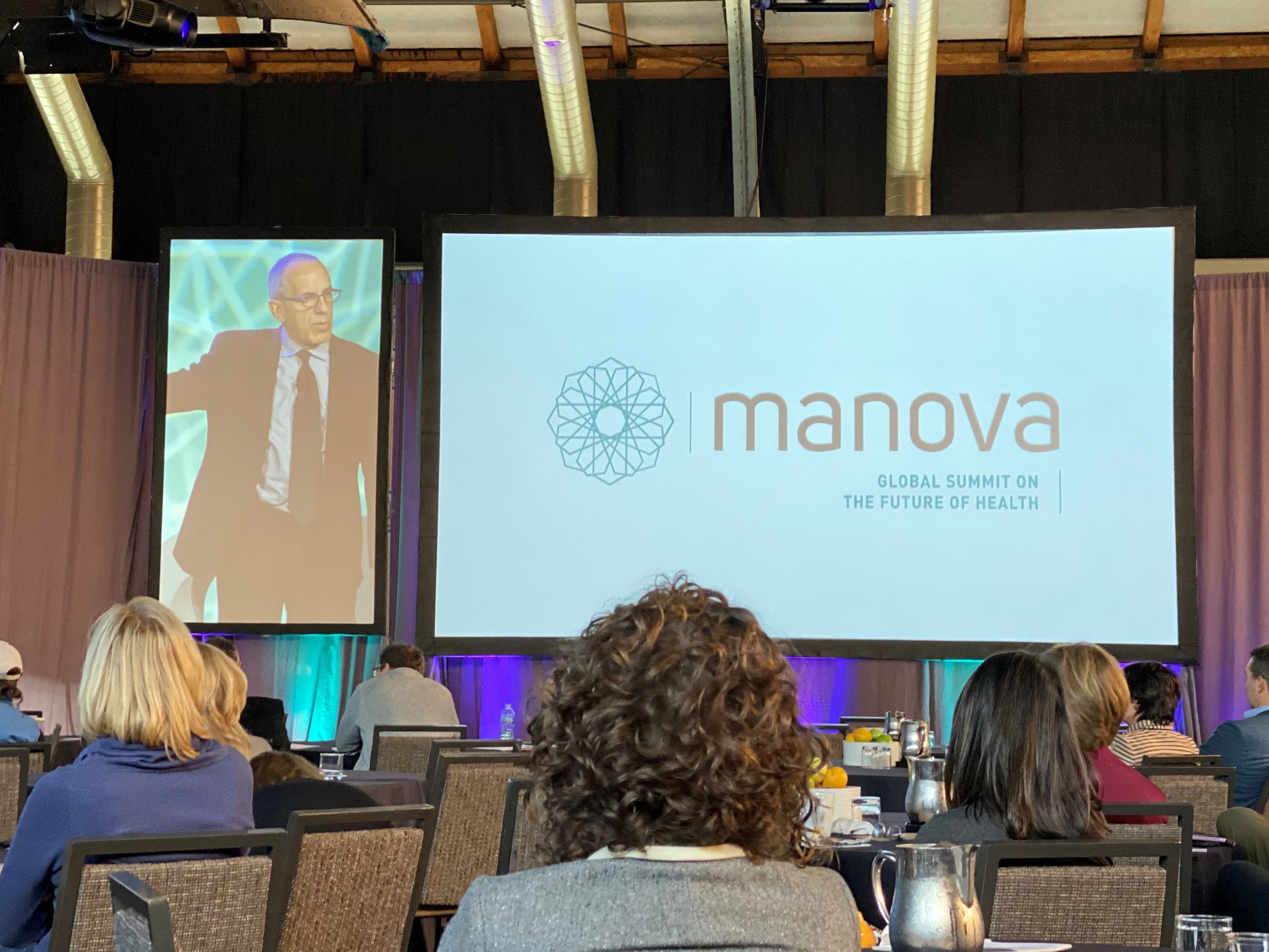My head is spinning—in a good way. And I feel inspired.
That’s how one should feel coming off of three days of fast-paced, enlightening discussions at the second-annual Manova: The Global Summit on the Future of Health.
Last year’s conference set a high bar. Yet, the resounding sentiment I heard from the attendees I spoke with was that this year’s event took a huge leap above the bar. Well done, Manova.
The organizers’ self-defined goal is “to improve the health of every human being on this planet.” And the spirit of the event is to bring together the disruptors and thinkers who are united in this goal to find common intersections, explore new partnerships and inspire new ways of problem-solving. Because, after all, we can achieve more progress toward our goal together than we can individually. That alone is why I get so excited about Manova.
The agenda included speakers from heavy hitters like Walmart, 3M, Ecolab, St. Jude Children’s Research Hospital, Google Health, Gallup and Forrester Research—as well as emerging disruptors like BlueDot Inc, Farmer’s Fridge, HabitAware, Healthy.io, and notOK App, among others.
It’s nearly impossible to summarize everything I heard and saw across three days into one blog post. Instead, I will focus on the five big-picture themes that stuck with me most, and those that I hope will make a lasting impression on the other leaders in attendance, as well.
- Progress is happening, and we should celebrate it.
There is a TON of really brilliant innovation out there, and the potential for progress is astounding.We have some of the world’s most talented minds focused on tackling major public health issues like pandemics, cancer, mental health, the opioid crisis and others. Each one of these issues is massive and incredibly challenging on its own. Frankly, it feels overwhelming. But, Manova reminds us to never stop thinking and to break the problems down into the most basic elements. Because sometimes, the simplest of innovations can make a huge difference, and you figure out how to scale it from there.
For example, Hannah and Charlie Lucas—17 and 15-year-old siblings—co-founded the notOK App to help people suffering from anxiety and depression ask for support from their trusted contacts at the touch of a button. And Healthy.io has transformed the smartphone into a medical device to help increase adherence for urine testing among the 73 million people at risk of chronic kidney disease in the US. These seemingly simple innovations are making a big impact. And they should be celebrated. As author and generations expert David Stillman said: “Let’s stop complaining [about what’s not working in healthcare], and start talking about what’s working.”
- We must improve health, not just treat the unwell.
There’s a lot of money to be made in healthcare. I believe we have a moral responsibility to pursue initiatives that will truly improve health, not just profit off of our unhealthy population. For example, what will you do to improve access to healthy food? To improve data sharing to enhance care integration, improve access to meaningful insights, and enhance problem-solving? To increase access to life-saving innovations across the globe? Take a hard look at your company’s purpose and evaluate where you have the resources and the scale to make the biggest impact.
- Education must be a top priority—for everyone.
Innovation doesn’t happen without education. And change doesn’t happen without education. Whatever category you’re in—whether it’s infection prevention or maternal health or health insurance, etc.—make education one of your key strategies for growth.Start by making a list of the gaps between what people believe today and what we need them to know/believe to affect lasting change. Then, develop a solution. Whether you develop a formal curriculum series for providers or launch a public awareness campaign or deliver a small reminder to your customers at every touchpoint with them—what will you do to move the needle?
As Katie Couric put it in her keynote: “You have to keep educating people and putting the word out. Make it so people can’t avoid the message.”
- Focus on the consumer.
We live in the era of the consumer. And healthcare, as an industry, is behind. Yet, as Jen Sanning of Forrester Research said: “Your customers don’t distinguish between industry lines.”The expectations of a rich consumer experience are the same for healthcare as they are for Netflix and Uber. Think about that. And take one look at Walmart. The company is jumping all over the opportunity to enhance the consumer experience in healthcare.
How will you compete? Look at every aspect of your consumer experience and figure out how to make it more convenient and frictionless. If you need a strong business case, Forrester has data to illustrate that revenue growth, employee satisfaction, CEO ratings, and the ability to charge a premium price all increase when you adopt a “customer-obsessed” mindset. Contact Jen if you’d like to get your hands on the data.
- How do we lower the cost of innovation to increase access?
We all know innovation is wonderful. It’s doing amazing things. But innovation is expensive. We need to figure out what we can do to drive cost out and make technological advancements more affordable across the globe. Your innovation may be perfect for US customers, but can you make a more basic version of it that works just as well in the developing world? Perhaps it doesn’t need all the bells and whistles your US customers want. Can you do that without cannibalizing your business opportunity in the US? This was the challenge issued by Thomas F. Burke, MD, chief of the division of global health innovation at Massachusetts General Hospital. He showed us several examples to prove that it is possible.
What strikes me about these five themes is they are relevant to every company in healthcare. Every single company can do more to: celebrate progress, improve health, focus on the consumer, educate, and lower the cost of innovation.
Manova is over until next year, but the conversation must not stop here. Molly Guy of Medtronic Labs may have said it best: “Be driven by the urgency of the work to be done.”
My challenge to you is: What progress will we talk about at Manova 2020?



